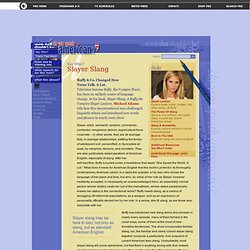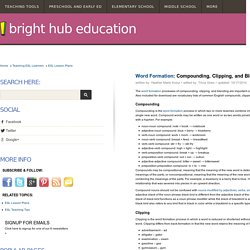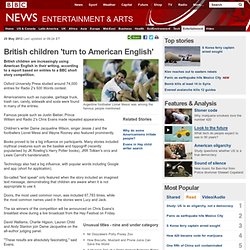

Getting worked up over "twerk" The Rad New Words Added to the Dictionary in the '90s: Where Are They Now? - Alexis C. Madrigal. Will twerk and phablet go the way of e-tailing and palmtop, or endure like geek and LOL?

Poking fun at new words added to various dictionaries is a time-honored journalistic tradition, nearly as well-loved as writing about nomenclature after the Social Security Administration's annual release of the country's most popular names. And for good reason: Everyone uses words and everyone has a name. It doesn't get more universal than the language we share. Getting worked up over "twerk" Do You Speak American . Words That Shouldn't Be? . Sez Who? . Buffy. Buffy & Co.

Changed How Teens Talk. A Lot. Television heroine Buffy, the Vampire Slayer, has been an unlikely source of language change. In his book, Slayer Slang, A Buffy the Vampire Slayer Lexicon, Michael Adams tells how this unconventional teen challenged linguistic taboos and introduced new words and phrases in nearly every show. Slayer, witch, werewolf, vampire, commando, contractor, vengeance demon, supernatural force incarnate – in other words, they are all average kids, in average relationships, battling the forces of adolescent evil, personified, in Sunnydale at least, by vampires, demons, and monsters. 'Hobbitses' and Frankenstein: how pop culture's words become official.
Water cooler conversation at a dictionary company tends towards the odd.

A while ago I was chatting with one of my colleagues about our respective defining batches. "I'm not sure," he said, "what to do about the plural of 'hobbit'. There are some citations for 'hobbitses', but I think they may be facetious uses. Have any thoughts? " Turning a scandal into a '-gate'
Happy 10th birthday, BuzzWord! BuzzWord from Macmillan Dictionary: Free English Dictionary Online with Thesaurus. 7 Words that Came About from People Getting Them Wrong. Forming New Words: Compounds, Clipped Words, and Blends in English. Written by: Heather Marie Kosur • edited by: Tricia Goss • updated: 10/17/2014 The word formation processes of compounding, clipping, and blending are important concepts when creating words.

Also included for download are vocabulary lists of common English compounds, clipped words, and blends. Compounding Compounding is the word formation process in which two or more lexemes combine into a single new word. Compound words may be written as one word or as two words joined with a hyphen. Visualizing Our Word Origins. Trench Talk: Words of the First World War: Amazon.co.uk: Peter Doyle, Julian Walker. First Known Use Of OMG In Letter To Winston Churchill (PHOTO) Are 'geek' and 'nerd' now positive terms? 15 November 2012Last updated at 20:07 ET By Kathryn Westcott BBC News Magazine Campaigners in Sweden are trying to force a dictionary to change its definition of "nerd".

But after two decades of "reappropriation" has "nerd" - and its sister word "geek" - now completely lost its derogatory connotations? In the 1984 film Revenge of the Nerds the rousing final speech of one of the protagonists starts with the statement: "I'm a nerd. " Its plot may be cartoonish but the film reveals a certain cultural backdrop - to be a nerd was to be socially awkward, even socially inferior.
Jocks, those who were good at sport, or other socially successful groups, usually ended up winning. Things have changed. Continue reading the main story. British children 'turn to American English' 29 May 2012Last updated at 09:24 ET Argentine footballer Lionel Messi was among the famous people mentioned British children are increasingly using American English in their writing, according to a report based on entries to a BBC short story competition.

Oxford University Press studied around 74,000 entries for Radio 2's 500 Words contest. Americanisms such as cupcake, garbage truck, trash can, candy, sidewalk and soda were found in many of the entries. Famous people such as Justin Bieber, Prince William and Radio 2's Chris Evans made repeated appearances. Children's writer Dame Jacqueline Wilson, singer Jessie J and the footballers Lionel Messi and Wayne Rooney also featured prominently. Books proved to be a big influence on participants. Technology also had a big influence, with popular words including Google and app (short for application). Britishisms and the Britishisation of American English. There is little that irks British defenders of the English language more than Americanisms, which they see creeping insidiously into newspaper columns and everyday conversation.

But bit by bit British English is invading America too. "Spot on - it's just ludicrous! " snaps Geoffrey Nunberg, a linguist at the University of California at Berkeley. "You are just impersonating an Englishman when you say spot on. Will do - I hear that from Americans. Peeve of the week: 20% correct. « previous post | next post » Matthew Engel ("Why do some Americanisms irritate people?

", BBC News 7/13/2011) starts out by describing the phenomenon of American lexical influence on British English.
November 2011. Words fall in and out of favour over time ‘Times may change, but the word times is not changing that much.’

The opening sentence of the researcher Paul Baker’s article invites us to consider how the frequencies of particular words in the English language rise and fall over time. For example, the word change is more than twice as frequent in 2006 as it was in 1931. Some, but certainly not all of this increase can be ascribed to the fact that it occurs in the phrase climate change, which is a recent coinage reflecting a contemporary concern.
Baker investigates changes in word frequency in published, written British English sampled from texts in different genres covering the press, general prose, learned articles and fiction. What of Baker’s results in this recent study? But the data shows other interesting patterns which are not linked to cultural change. Who makes a language change begin? Are gregarious people linguistic innovators?

Watch your manguage. Gender and sexual orientation: Alphabet soup. The 10 best words the internet has given English. My book Netymology: A Linguistic Celebration of the Digital World is about the stories behind new words. I've been an etymology addict since I was a teenager, and especially love unpicking technological words. It's a great reminder of how messily human the stories behind even our sleekest creations are – not to mention delightful curiosities in their own right. 1. Viewpoint: Why do tech neologisms make people angry? The bewildering stream of new words to describe technology and its uses makes many people angry, but there's much to celebrate, writes Tom Chatfield. From agriculture to automobiles to autocorrect, new things have always required new words - and new words have always aroused strong feelings. In the 16th Century, neologisms "smelling too much of the Latin" - as the poet Richard Willes put it - were frowned upon by many. Text-speak: language evolution or just laziness?
Texting is “miraculous”: 6 ways we are redefining communication. John McWhorter asks us to think of texting less as “written language” and more as “fingered speech.” Photo: James Duncan Davidson Texting is not a blight on the English language, says linguist John McWhorter in today’s talk, given at TED2013. Rather, texting is a “miraculous thing”: a novel linguistic mode that’s redefining the way we communicate with each other — for the better. John McWhorter: Txtng is killing language. Chavs, sluts and the war of words. Like an expedition to the source of the Nile, any attempt to find the origins of a word runs aground when the trail vanishes into a realm without tangible records: oral culture.
As Baroness Hussein-Ece – she who was "trapped in a queue in chav-land" – will tell you, Twitter is oral culture but with records. But words have power beyond their mere meaning. They still bear the hallmarks of the Garden of Eden, in which the language spoken by Adam contained the essence of the thing it described, and so controlled it. Goodbye chillaxing, hello omnishambles: the phrases that fell in and out of fashion this year. Grexit, drachmail and eurogeddon - the new eurozone words. Omnishambles beats Eurogeddon, Gif and Mobot as Oxford word of the year. Omnishambles named word of the year by Oxford English Dictionary.
13 November 2012Last updated at 06:23 ET Foul-mouthed fictional spin doctor Malcolm Tucker has left his mark on the English language "Omnishambles" has been named word of the year by the Oxford English Dictionary. Amazeballs to Zing: new words added to Collins online dictionary. Your BuzzWords of 2012. The Macmillan Dictionary BuzzWord feature turns 10 years old later this month! To celebrate this 10th anniversary, we will be posting interesting BuzzWord-related content here on the blog throughout the year. The first in this series is a quick look back at the BuzzWords of 2012.